► UK’s best hybrid cars on sale in 2024
► Our pick of the top part-electric buys
► Plug-in and ‘self-charging’ hybrids covered
With the future looking so decidedly electric, is there a place for hybrid and plug-in hybrid cars in 2024? We say most definitely yes – not everyone’s budgets or lifestyles will suit a fully electric car, and hybrids can be a great stepping stone technology to bridge the gap.
Until electric vehicles (EVs) are cheaper and charging them as straightforward as chucking liquid fuel into a tank, there are many buyers who will be better served by a hybrid. These come in all shapes and sizes, from superminis to hybrid SUVs and seven-seater hybrids, to clean up your emissions and cut your motoring bills.
EDITOR’S PICK: CAR magazine’s panel of road testers have driven every hybrid car on sale today, and you can read our best hybrid car selections below. But if we had to pick one, we’d name the BMW 330e as our favourite – it’s a hybrid car that can do it all, especially in modish Touring spec.
To help you make the best decision, we’ve picked 10 of the best hybrids across every category. Whether you’re looking for a petrol-electric supermini, hybrid estate car or plug-in supercar, there’s something here to suit you.
Best hybrid cars in 2024
What’s the best hybrid car in the UK? The answer depends on the kind of car you want, so we’ve picked 10 of the best to cover as many bases as we can. All of the below offer hybrid or plug-in hybrid power and features that place them above their immediate rivals.
Toyota Corolla
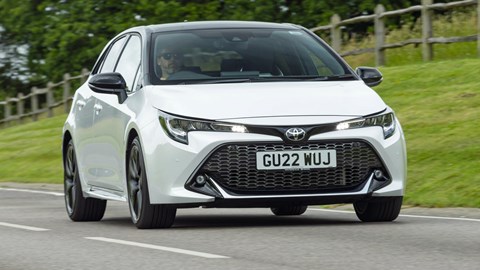
Best for: My first hybrid
Pros: Clever hybrid system, reliability baked in, choice of body styles
Cons: Not the most exciting hybrid on sale, so-so interior
Toyota has long been the self-charging hybrid champion, having invented the genre with its Prius back in 1997, and the Corolla packs all that learning into a sensible family car. The Toyota Corolla is an excellent all-rounder, available as a hatchback, Touring Sports estate and even a van, and with a choice of two hybrid engines. It isn’t quite as sharp to drive as it is to look at, but the current model can deliver big real-world mpg.
The newest Corolla introduces an even more efficient fifth-generation Toyota hybrid system that makes a big difference to the driving experience, too. Seriously, don’t scoff. It’s a great place to start.
Read our Toyota Corolla review.
View Toyota Corolla lease deals VIEW OFFER
BMW 330e
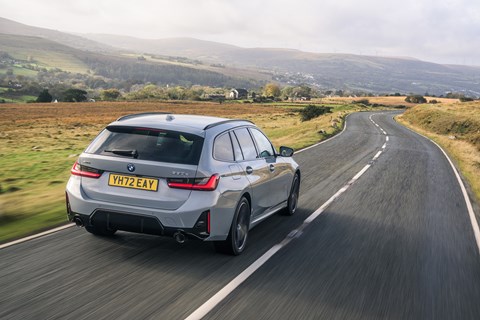
Best for: Those wanting a Q-car hybrid express
Pros: Great performance, sharpest dynamics of any rival, saloon or Touring estate
Cons: So popular there can be a waiting list
Speaking of excellent all-rounders… combining a 2.0-litre turbo petrol engine with a 111bhp electric motor and a battery big enough for up to 37 miles of claimed electric driving (increasing to 63 miles with an update to the 2024 3-series range), the 330e plug-in hybrid does the eco thing and the BMW 3-series fun driving thing with admirable aplomb.
With up to 289bhp available from the powertrain for short periods – XtraBoost ramping it up from the usual 249bhp when required – the 330e is very fast. The option of a Touring estate body makes it practical, too.
Read our BMW 330e review.
View BMW 330e lease deals VIEW OFFER
Lexus LC500h
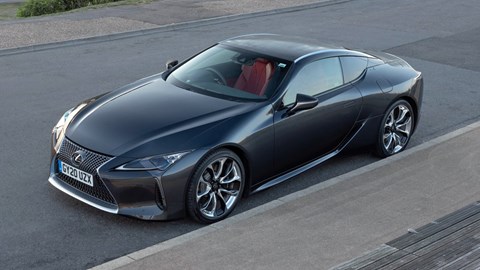
Best for: Hybrid style seekers
Pros: Knock-out design, beautifully finished, performance clout
Cons: A bit rare-groove, prices start at £96k…
Not an obvious eco-champion, perhaps. But if you want a part-electric jaw-dropping style statement, few cars contend with the 354bhp Lexus LC500h.
The stunning looks are combined with a blindingly complex drivetrain – which features a three-speed E-CVT gearbox that spends its time pretending to be a 10-speed automatic (not always successfully) – and while the 3.5-litre V6 and electric motor aren’t as fun as the alternative 5.0-litre V8, your fuel economy will definitely be better.
Read our Lexus LC500h review.
View Lexus LC500h lease deals VIEW OFFER
Hyundai Santa Fe
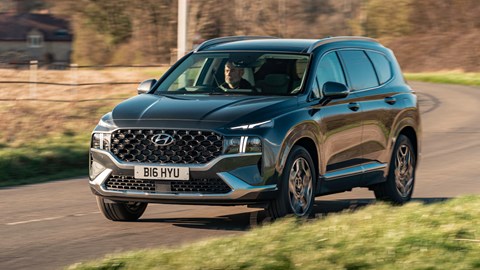
Best for: Families with a conscience
Pros: Properly roomy family SUV, seven seats available, decent e-range
Cons: Styling not to all tastes
Though the latest Santa Fe might not be as outstandingly exciting to look at as some other recent Hyundais, it is a proper seven-seater SUV that’s available as both a self-charging hybrid and plug-in hybrid, alongside old-school diesel powertrain options.
Most impressive about the plug-in hybrid Hyundai Santa Fe is not so much the claimed 36-mile electric range – knock about 10 off that in the real world – as the fact that you don’t lose any space in the rear row of seats. The closely related Kia Sorento is a good hybrid option, too.
Read our Hyundai Santa Fe review.
View Hyundai Santa Fe lease deals VIEW OFFER
Peugeot 308 Plug-In Hybrid
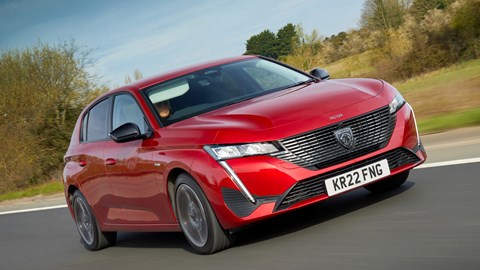
Best for: Those who are bored of the ubiquitous VW Golf
Pros: Fun to drive, crisp styling, clever hybrid tech, choice of bodystyles
Cons: Not everyone will love the i-Cockpit cabin
Winner of the CAR ‘Formula PHEV’ Giant Test, beating plug-in hybrid versions of the VW Golf and Mercedes A-Class, this punchy Peugeot 308 delivers a decent 222bhp in combination with near 40mpg real-world economy and around 27 miles of electric-only capability.
It’s also stylish and fun to drive – and if not quite as sharp as a standard 308, the refinement compensates. Note that you can now get a Vauxhall Astra that uses the same tech, and the Golf proved even more efficient. Just watch out for the brand’s unusually small steering wheel as part of the i-Cockpit layout.
Read our Peugeot 308 Plug-in Hybrid review.
View Peugeot 308 lease deals VIEW OFFER
Toyota Yaris
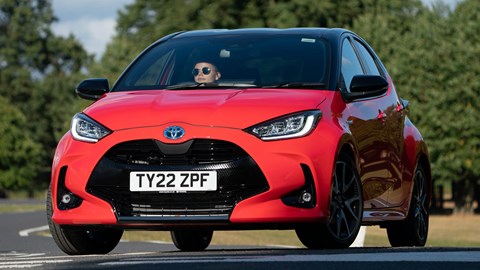
Best for: Those living in crowded city spaces
Pros: Decades of hybrid know-how in a supermini, great reliability record
Cons: Not the roomiest small car on sale today
The best of a surprisingly good bunch of small hybrids is the Yaris. Another tasty-looking Toyota, unless you drive like a hooligan, this little thing can deliver a realistic 60mpg despite only being a self-charging model. And like other Toyotas, you get up to 10 years of warranty cover, giving added peace of mind.
Hard to argue against, then – but if you want a little more space, the Yaris Cross and the Honda Jazz CrossStar both offer more room inside and bit of a tiddly SUV vibe.
Read our Toyota Yaris Hybrid review.
View Toyota Yaris lease deals VIEW OFFER
Mercedes-Benz E-Class hybrid
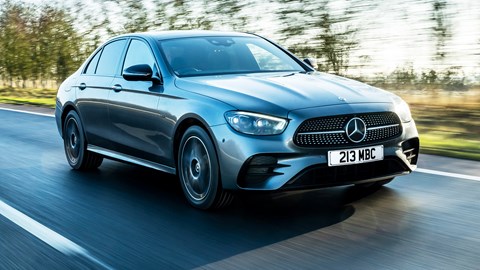
Best for: Long-distance commuters
Pros: One of the few diesel hybrids available – and consequent long range, plus 60mpg potential
Cons: You’re still attached to the dirtier fuel choice…
You’re offered a choice of E-Class plug-in hybrids, but we’ve gone for the increasingly unusual E 300 de – the ‘d’ standing, yes, for diesel. Before you start crossing yourself and casting out the demons, remember that diesel is still a great long-distance fuel and brings admirably low CO2 emissions.
Combine that with the claimed 34-mile electric range for urban pottering, and you’ve got the best of both worlds – not to mention a real-world 60mpg in our experience. A petrol alternative is available if you really can’t do the diesel anymore, but that one isn’t available as an estate. And the big boot is brilliant on these.
Read our Mercedes E-class hybrid review.
View Mercedes Benz E-Class lease deals VIEW OFFER
BMW X5 xDrive45e
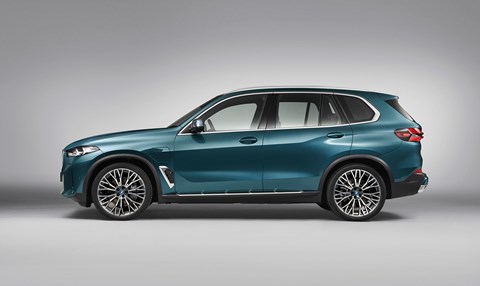
Best for: Those wanting to assuage their Chelsea tractor guilt
Pros: Super-long range means 50 miles of electric driving, typical BMW dynamics
Cons: Do the maths to make sure the premium is worth it
Our pick of the premium hybrid SUVs is this plug-in hybrid version of the BMW X5. Pairing a 3.0-litre straight-six with an electric motor and all-wheel drive, it’s powerful (388bhp) and fast (0-62mph in 5.6sec, 146mph), and maintains that typical BMW driving edge that makes almost all of its cars so exciting.
The xDrive45e also has a chunky maximum claimed electric driving range of 54 miles; with a maximum EV speed of 83mph, the petrol engine can take plenty of time off. We’ve driven several of these and can vouch for the extraordinarily long e-range.
Read our BMW X5 xDrive45e review.
View BMW X5 lease deals VIEW OFFER
Mercedes-Benz S580e L
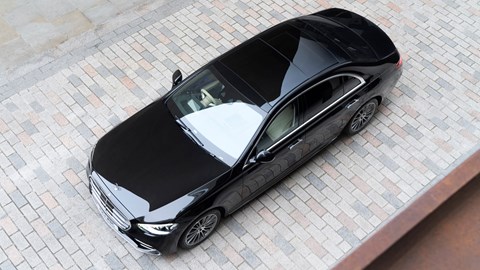
Best for: Execs who want whisper-quiet refinement
Pros: Limousine style with mainstream fuel costs, long 65-mile e-range
Cons: You’ll need deep pockets to afford the £110k price
With an asking price of around £110k before options, the S-Class hybrid isn’t cheap. But it also offers the longest claimed EV range of any plug-in hybrid in this list – 65 miles – and features DC charging compatibility, so you can top that back up to 80% in just 20 minutes. Most plug-in hybrids make do with slower AC charging.
Plus, the S580e is packed with all the usual luxuries of Mercedes’ conventional flagship. Not sporty enough for you? Then consider the Porsche Panamera S E-Hybrid if you can live with something that isn’t quite so limo-like.
Read our Mercedes S-Class S580e L hybrid review.
Ferrari 296 GTB
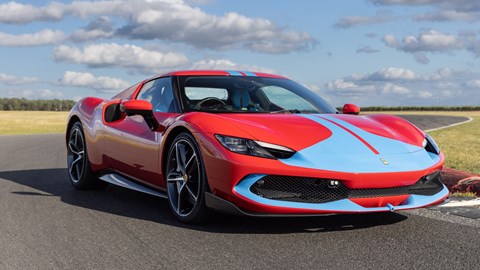
Best for: Tech heads in a rush
Pros: You can have a supercar that cares about the planet! Raw performance, speed, and style guaranteed
Cons: Overdraft required to buy, run, service…
We did mention supercars right at the beginning, and there are a few hybrid sports cars to choose from, including the new McLaren Artura. But while the Macca still seems to be facing some teething troubles, we’ve opted for the majestic, magical Ferrari 296 GTB – the car that proves a prancing horse no longer needs a minimum of eight cylinders to thrill.
This electric motor-boosted 3.0-litre V6 makes 819bhp, does 0-62mph in 2.9sec and has a top speed of 205mph, and is simply sensational to drive. And, yes, it’ll even creep around town silently on electric power (for a short distance, at least).
Read our Ferrari 296 GTB review
Why buy a hybrid car?
Hybrid cars are getting increasingly popular, making up 18% of all new cars sold in the first half of 2023. It’s easy to see why: they represent an easy-to-live-with, cheaper, but useful stepping stone to fully electric vehicles.
Thanks to energy recuperation when braking and coasting, hybrid cars are more economical than traditional internal combustion cars, and most can creep silently around town on electric power. Your taxman will be grateful for their lower CO2 emissions and high mpg figures, making them cleaner and cheaper to run (especially as a company car).
Hybrid or plug-in hybrid?
We’ve got a full explainer page on hybrid car tech, but the simple difference here is that regular hybrids – sometimes referred to as ‘self-charging’ hybrids – don’t need to be plugged in at any point. Instead, the batteries that power their electric motors are recharged by energy recuperation when slowing down.
The other type of hybrid is the plug-in hybrid electric vehicle, often shortened to PHEV. The only difference is that they can be plugged in at home, so you’ll find an extra charging port on the front, flanks or rear of the car (see below).
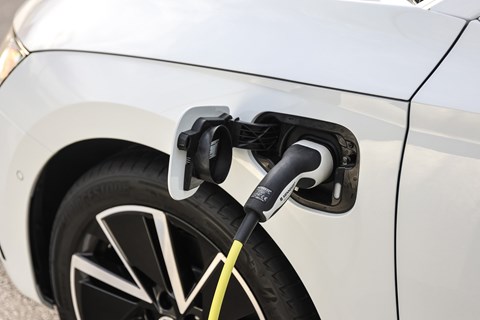
PHEVs have much larger batteries. To make the most of them, you need to plug them into the mains – as with a pure electric vehicle, so you start every journey with a full battery. That means charging at home or using a public charging network.
The larger batteries give plug-in hybrids much greater electric-only driving capability than self-charging hybrids – to the extent that many shorter journeys won’t need to trouble the internal combustion engine at all. But they are also heavier and more expensive to buy in the first place.
What’s the most reliable hybrid car in the UK?
While we’d be happy driving any of the above, for some buyers, reliability is the primary consideration when choosing a car. And if that’s the case for you, we’d strongly advise turning to Japanese or Korean brands if you’re after the most reliable hybrid car.
The Corolla and Yaris hybrids in our top 10 should be well up there, for example. But you could also consider the Toyota RAV4, the Honda CR-V hybrid, the Lexus UX hybrid or Lexus NX hybrid from Japanese brands – or the Hyundai Ioniq hybrid and the Kia Niro Hybrid from South Korea.
Buying secondhand? We have a round-up of the best used hybrid cars, too.
Are hybrid cars cheap to run?
Buying hybrid means you avoid the high purchase price of a pure battery electric vehicle (BEV) and potentially benefit from less expensive company car tax, VED, and Congestion Charge tolls to boot. Be sure to factor these into your calculations before you take the plunge.
Opting for a plug-in hybrid can make driving even cheaper. Since these tend to offer 30-40 miles of emissions-free travel, they can reduce multiple monthly trips to the fuel station, especially if you mostly do short journeys and are able to charge up at home overnight.
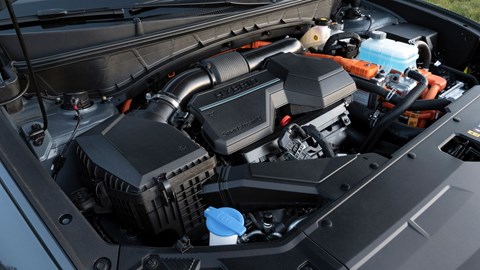
On the other hand, self-charging hybrids won’t need access to an electric car charger to make the most of them, and the latest models run on electric power alone a considerable amount of the time.
As ever, your driving style is an important deciding factor in how efficient your hybrid car will be. If you’re foot-to-the-floor everywhere, you’ll end up with high running costs no matter what you drive. Plan ahead and be measured with your inputs, and your running costs should fall accordingly.
Check out our list of the cheapest hybrid cars if you’re on a tight budget. And if you are ready to plug in fully, here’s our guide to the best electric cars you can buy today.